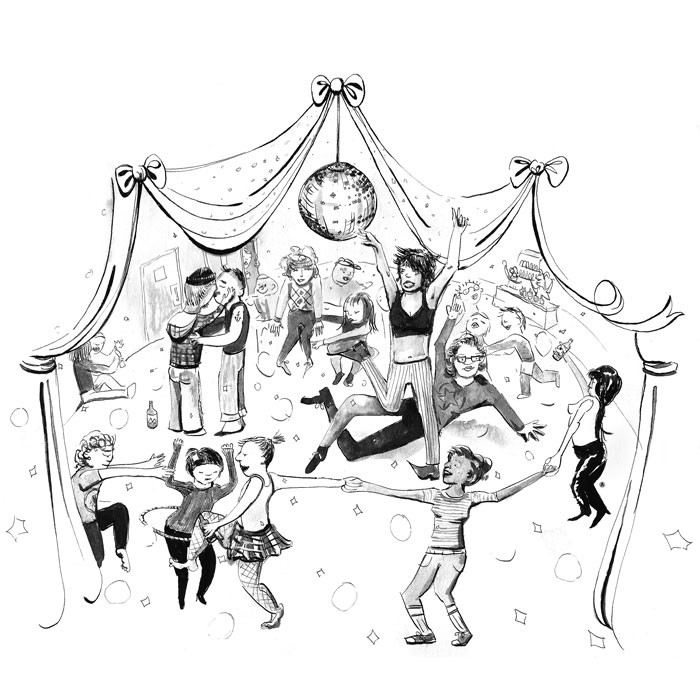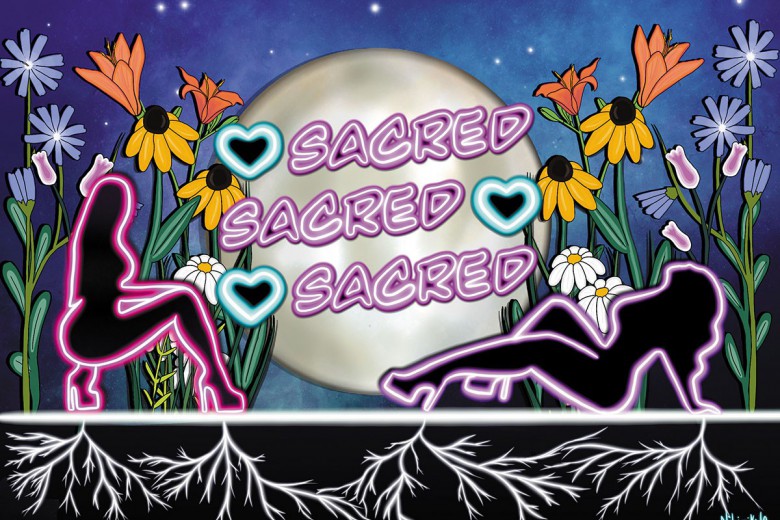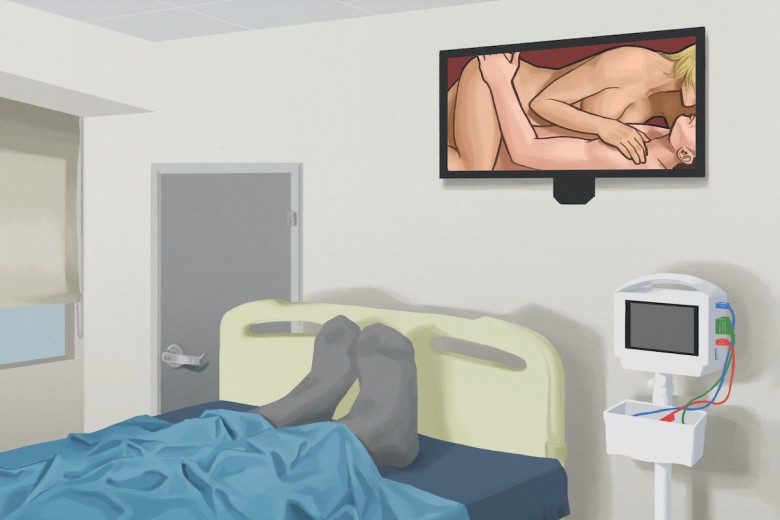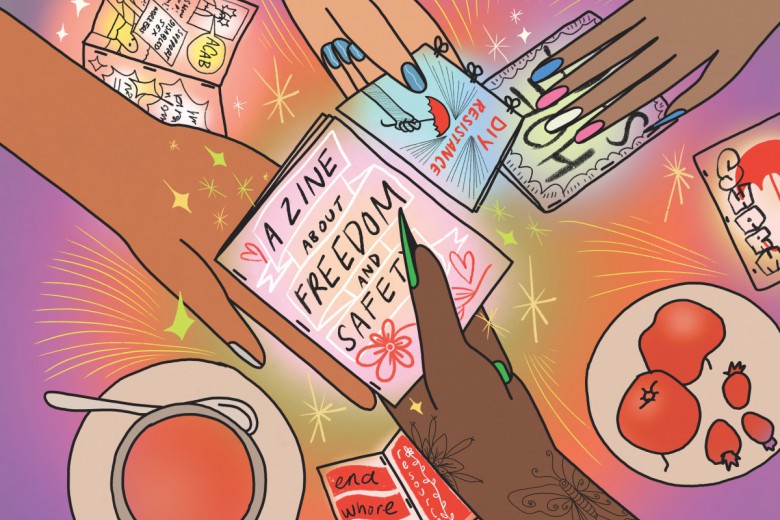
On the third Saturday of every month, a throng of self-identified queers descend on an East Vancouver community centre in search of cheap drinks, good music, and the chance to dance off the month’s drudgery in a safe and inclusive environment. These parties, thrown by the local Fuck Off and Dance (FOD) collective, are well known throughout the community for offering an alternative to the famous West End bar scene, which is thought by many East End queers, including FOD collective members, to be “shallow, apolitical, capitalistic, expensive, exclusionary, trans-phobic, ableist, inaccessible, queer-phobic, totally homo-normative, and male-dominated, with girls who want to look like the L Word version of what a lesbian is.”
After attending several FOD parties I decided to sit down with members of the collective to discuss their reasons for rejecting Vancouver’s gay bar scene and organizing their own queer dance parties instead.
I was invited to attend the tail end of one of the collective’s weekly meetings, held in a dimly lit but homey-feeling basement suite just off Commercial Drive. Vancouver’s East End, with Commercial Drive as its epicentre, is known for being artsy and activist-filled, with a strong community feel. The houses are painted bright colours; coffee shops, fair trade importers and fruit markets abound. When I entered, collective members were sitting on mismatched furniture, drinking herbal tea and talking finances.
Although they were excited to discuss the party, they requested that I not print their names, preferring me to attribute their comments to “the collective.” Jokingly, one member suggested they were “like (Star Trek‘s) The Borg,” a race of hybrid robot/organic beings bent on interplanetary assimilation. “Except in a good way.”
Their desire to present a unified front underscores the group’s guiding principles. “We run things by consensus. That was really important to all of us when we started planning and organizing [the parties] so that one person isn’t in charge and people can come and go and the power doesn’t tip.” Another member added, “[When you speak as a collective] everybody is heard, everybody is considered and valued. It’s about love and respect, and it’s about anti-oppression and supporting each other, and an array of perspectives. You can reach more people. We don’t have everyone in the community represented here, but maybe someday we will.”
Overwhelmingly, however, the current demographic of the party-planners aligns quite closely with that of the partygoers: predominantly young, white, and queer-identified folk looking for a good time. The parties also seem to attract more women than men, and more gender-non-conforming folk than I generally see out at mainstream gay bars. The collective’s goal is to “queer” the gay bar experience, which they define as providing “an alternative to what we were saying about the West End. It’s not image-centred, it’s not class-centred, it’s not sexuality-centred, it’s not gender-centred, it’s kind of radicalizing all of those things, and I think being political, or striving to be, trying to be. And a safe space. Which means it’s inclusionary of allies.”
The hundreds of people who attend these parties every month seem to agree that there’s a need for a safer and more inclusive weekend option. Although the mainstream bar scene is important to the gay community, many young queers are not interested in what they see as the expensive, exploitative and uncomfortable atmospheres of many downtown gay bars. According to one member, “going to [mainstream] clubs means getting groped and touched and, you know, you wait in line for two hours, you pay $12 [to get in], you wait in line for a drink and it costs you six. It’s not fun.”
Many people don’t realize that transgender and gender-non-conforming folk, as well as allies and working-class or poor people, report facing discomfort at many mainstream bars. There is a lot of pressure to be “appropriately” or fashionably gay, which acts as a barrier for some members of the gay community. As well, the sexualized environments of these bars can often lead to unwanted sexual attention, which is not always addressed by bouncers or club owners. A lot of FOD partygoers are fed up with feeding their money into a corporate-feeling club scene where they feel like someone’s cashing in on their discomfort. “People know that [at FOD] the money they’re spending is going back into the party. No one is profiting off people having fun.”
FOD parties are designated as safe and accessible spaces. The collective specifically chose a venue that is physically accessible, with non-gender-specific bathrooms. They offer free, volunteer-staffed off-site child care, and admission is charged on a sliding scale, with a policy that no one will be turned away for lack of funds. “And drinks cost three bucks, so you can afford to get in and have a couple of beers, and just focus on shaking your ass and having a good time.”
The collective’s focus on safety is evident in all areas of party planning, from security to decorations. While the collective does hire security staff, they purposely stay away from “big, burly, intimidating men. [We hire] people from the community. We have a safety approach, making sure that nobody’s passing out, or riding their bikes home drunk, and make sure that washrooms are fine and nobody’s getting into fights.” FOD partners with a local queer-positive sexual assault organization to promote a respectful and sexually responsible environment at the parties, which prominently feature posters reading “Ask. Listen. Respect” and “This is What Consent Looks Like.”
Similar to a mainstream bar, of course, many people come to FOD parties to hook up. And the collective is glad they do. “You spend the time and you put the party together and it’s midnight and people are laughing and dancing and flirting and kissing, and people are getting laid because of us, right over there! It’s the best part.” They mean “right over there” quite literally, as parties feature a make-out booth, and the baskets of condoms, gloves and female condoms by the door are always cleared out by last call. It’s not unusual to see two or even three pairs of legs in a bathroom stall after midnight, and there’s never any shortage of dance-floor groping.
The collective members emphasize, though, that the party’s sexual activity is non-exploitative and consensual. “We let people know that the people organizing the party are aware of these problems and we’re not okay with them. We won’t ignore you, or capitalize on you getting touched or treated inappropriately.” I asked the collective if there had ever been a time that they had to intervene, but they shook their heads as one.
One collective member explained, “People get in the space and they feel the energy and I think they just live [in a safe-space way] while they’re there. We create the space and people enter it and they feel it and they just behave in a way that’s respectful and inclusive.” As New Age and idealistic as that sounds, the vibe they describe is definitely there. Which makes hooking up in the bathroom much sexier.





